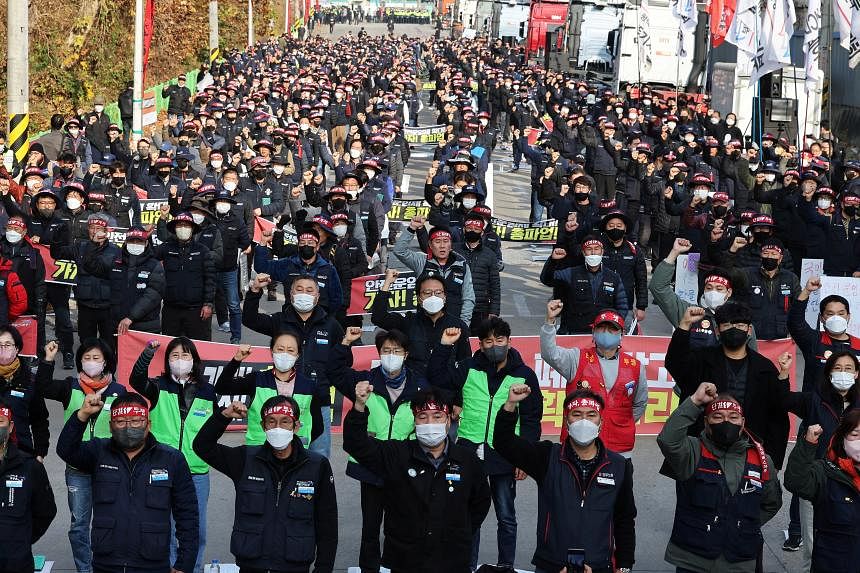SEOUL – South Korea’s transport ministry plans to negotiate with the striking truckers’ union on Monday, a ministry official said on Saturday.
Thousands of unionised truckers on Thursday launched their second major strike in less than six months, seeking better pay and working conditions.
The action is already disrupting supply chains across the world’s 10th largest economy, affecting automakers, cement and steel producers.
“We requested dialogue with the union, and the truckers’ union replied that they would meet with us on Monday… The talk is not yet finalised, but we plan to meet with the union and talk,” the ministry official told Reuters.
“We are ready to talk about reasonable demands of the trucker’s union at any time and will make efforts to solve the issues,” the ministry said in a statement on Saturday, adding it expects to see the effects of the action across industries such as steel, by early next week.
Damage is already visible at construction sites, while workers at Hyundai Motor’s Ulsan factory are delivering new cars by driving them directly to customers.
A union official confirmed Monday’s meeting, which would be the first official dialogue between the two sides.
The transport ministry said about 5,000 people attended the strike on Saturday morning in about 136 locations nationwide, down from 9,600 people on the first day of the strike.
With fuel costs soaring, the truckers are calling on the government to make permanent a minimum-pay system known as the “Safe Freight Rate” that is due to expire by the end of 2022, and to expand benefits for truckers in other industries, including oil tankers.
The government has said it will extend the scheme for three years but rejected other union demands.
In June, an eight-day strike by truckers delayed cargo shipments across Asia’s fourth-largest economy, costing more than US$1.2 billion (S$1.65 billion) in lost output and unmet deliveries before it ended with each side claiming it won concessions.
South Korean President Yoon Suk-yeol warned on Thursday that the government would consider various options, such as issuing an order to break up the strike, calling it as an illegal and unacceptable move to take the national supply chain “hostage” during an economic crisis.
According to South Korean law, during a serious disruption to transportation, the government may issue an order to force transport workers back to their jobs. Failure to comply is punishable by up to three years in jail, or a fine of up to 30 million won (S$30,900).
The Korea International Trade Association received 53 reports of disrupted logistics from 31 companies since the strike began.
Container traffic at ports dropped to 19 per cent of normal levels as of 5pm on Saturday, the transport ministry said, down from 35 per cent of normal levels in the morning.
The transport ministry expressed concerns about disruption in the supply of petrol and kerosene if the strikes are prolonged, as about 80 per cent of truckers carrying oil products for major refiners such as SK Innovation’s SK Energy and S-Oil Corp are members of the trucker’s union.
The cement industry estimated an output loss of about 37 billion won as of Friday, said lobby group Korea Cement Association. It added that the industry only managed to ship about 20,000 tonnes of cement on Friday, just about 10 per cent of usual daily shipments. REUTERS

